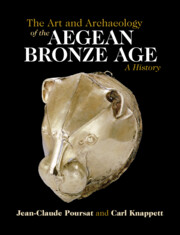Book contents
- The Art and Archaeology of the Aegean Bronze Age
- The Art and Archaeology of the Aegean Bronze Age
- Copyright page
- Contents
- Figures
- Introduction
- Part I Aegean Neolithic Art
- Part II The Art of the Aegean Early Bronze Age
- Chapter 6 Artefacts and Contexts
- Chapter 7 Architecture
- Chapter 8 Early Bronze Age Aegean Glyptic
- Chapter 9 Sculpture
- Chapter 10 Stone Vases, Metalware, and Miscellaneous
- Chapter 11 Early Bronze Age Pottery in the Aegean
- Part III Aegean Art in the Cretan First Palace Period
- Part IV Aegean Art in the Second Palace Period
- Part V Aegean Art in the Cretan Second Palace Period
- Part VI Aegean Art in the Final Palatial Period of Knossos
- Part VII Aegean Art of the Mainland Mycenaean Palatial Period
- Part VIII Aegean Art at the End of the Bronze Age
- Afterword Aegean Art Through Forgers’ Eyes
- References
- Index
- Plate Section (PDF Only)
- References
Chapter 9 - Sculpture
from Part II - The Art of the Aegean Early Bronze Age
Published online by Cambridge University Press: 19 May 2022
- The Art and Archaeology of the Aegean Bronze Age
- The Art and Archaeology of the Aegean Bronze Age
- Copyright page
- Contents
- Figures
- Introduction
- Part I Aegean Neolithic Art
- Part II The Art of the Aegean Early Bronze Age
- Chapter 6 Artefacts and Contexts
- Chapter 7 Architecture
- Chapter 8 Early Bronze Age Aegean Glyptic
- Chapter 9 Sculpture
- Chapter 10 Stone Vases, Metalware, and Miscellaneous
- Chapter 11 Early Bronze Age Pottery in the Aegean
- Part III Aegean Art in the Cretan First Palace Period
- Part IV Aegean Art in the Second Palace Period
- Part V Aegean Art in the Cretan Second Palace Period
- Part VI Aegean Art in the Final Palatial Period of Knossos
- Part VII Aegean Art of the Mainland Mycenaean Palatial Period
- Part VIII Aegean Art at the End of the Bronze Age
- Afterword Aegean Art Through Forgers’ Eyes
- References
- Index
- Plate Section (PDF Only)
- References
Summary
Cycladic marble figurines have generated so much interest that they have become the focus of a separate field of enquiry within Aegean art. This inflated interest is relatively recent: few marble figures were known before the end of the nineteenth century; the first museum acquisitions (British Museum, Dresden, and Karlsruhe) date from the 1840s, and we have to wait until the explorations of the English traveller James Theodore Bent in 1883–4 for a renewed interest (J. Bent, JHS 5, 1884, 42–59). They are first mentioned in studies of Greek sculpture from this period, and are thought of, in comparison to Classical art, as ‘primitive’. For Collignon, ‘these first attempts at sculpture take us back to a distant time when barbarism still held sway in the lands that will one day be Greece.
- Type
- Chapter
- Information
- The Art and Archaeology of the Aegean Bronze AgeA History, pp. 51 - 60Publisher: Cambridge University PressPrint publication year: 2022



